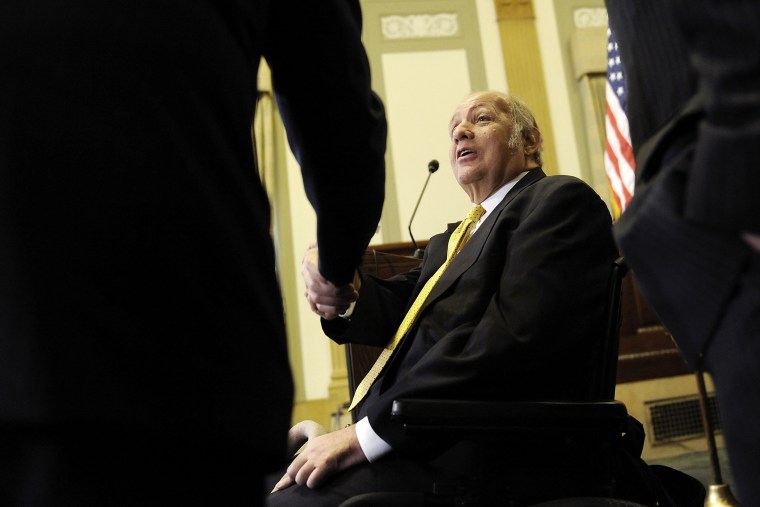Former White House press secretary James Brady died Monday from a series of health issues. He was 73.
Brady, the press secretary and assistant for former President Ronald Reagan, was shot and seriously wounded in 1981 during an assassination attempt on the commander-in-chief. Brady and his wife Sarah consequently joined the fight for sensible gun-control laws, and he became the namesake for the Brady Campaign to Prevent Gun Violence when the organization renamed it in 2001. (The group was previously known as the Handgun Control, Inc.)
"Jim is a legend at the White House for his warmth and professionalism as press secretary for President Reagan; for the strength he brought to bear in recovering from the shooting that nearly killed him 33 years ago," President Barack Obama said Monday in a statement.
Brady did not publicly support gun-control measures until 1989, the same year his wife became the chair of the Handgun Control, Inc. and when Reagan left office. The president's administration was a staunch defendant of Americans' Second Amendment rights.
But the right criticized Brady for favoring gun control. Instead of recognizing him for once holding the positions as a lauded Republican president's press secretary and assistant, conservatives mocked him and his wife for acting as enemies of the Second Amendment.
In an attempt to assassinate the president, gunman John Hinckley shot Reagan, Brady, and two law enforcement officials on March 30, 1981. Brady suffered a serious head wound that left him partially paralyzed and confined to a wheelchair for the rest of his life. He eventually returned to work in Reagan's administration, but with limited ability.
The former press secretary pushed for legislation that would require a five-day waiting period and mandatory background checks for handgun purchases. In 1991, Reagan voiced his support for Brady’s campaign. Two years later, after a lengthy bipartisan struggle to pass the legislation, former President Bill Clinton signed the Brady Handgun Violence Prevention Act into law on Nov. 20, 1993. Reformers continue to call on Congress to "finish the job" and resurface the gun-control debate.
Brady, nicknamed "The Bear," became a lifelong critic of the National Rifle Association, whose leaders on Monday expressed their "heartfelt condolences" on his death.
"Because of Jim's hard work and the policy that bears his name — the Brady Handgun Violence Prevention Act — an estimated 2 million gun sales to criminals, domestic abusers and other dangerous people have been blocked. As a result, countless lives have been saved," the Brady Campaign said in a statement. The group's leaders also referred to him as a "true American hero" who worked tirelessly for gun control.
Brady was awarded the Presidential Medal of Freedom, Presidential Citizens Medal, and the Abraham Lincoln Award for acting as a "national hero." He also served as vice chairman both of the Brain Injury Association of America and the National Organization on Disability. He was an honorary member of the Board of Trustees for the Brady Campaign and Law Center to Prevent Gun Violence, and received recognition from other national organizations. In 2000, Clinton officially named the White House Press Briefing Room in Brady's honor.
Obama added that every day reporters walk by a plaque commemorating the James S. Brady Press Briefing Room. "It reads, 'May his courage and dedication continue to inspire all who work in this room and beyond,'" the president said. "Those words will endure, as will his legacy."
A public celebration of Brady's life is planned for later this year.
"Jim Brady's zest for life was apparent to all who knew him, and despite his injuries and the pain he endured every day, he used his humor, wit and charm to bring smiles to others and make the world a better place," his family wrote in a statement, adding that he turned "adversity into accomplishment."
